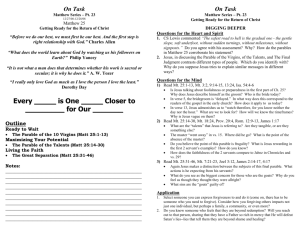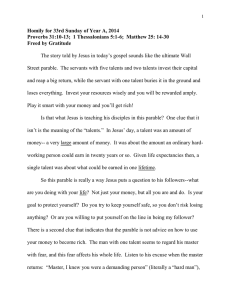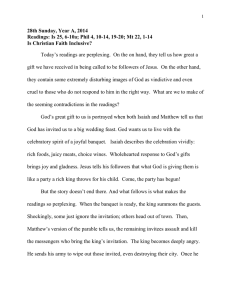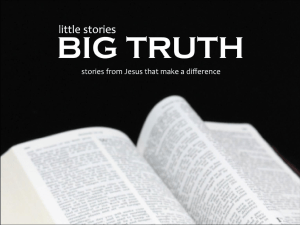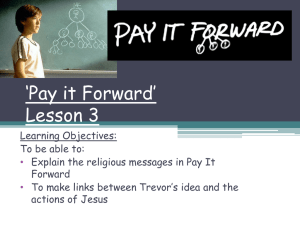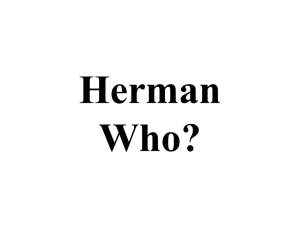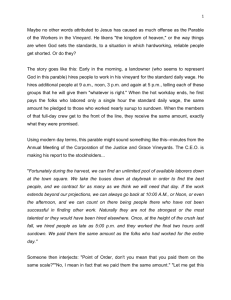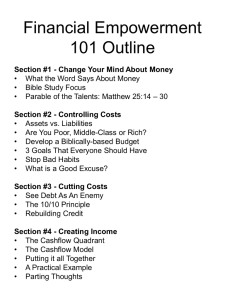23rd Sunday after Pentecost / Year A 16 Nov 2014 / Meadow Lea
advertisement
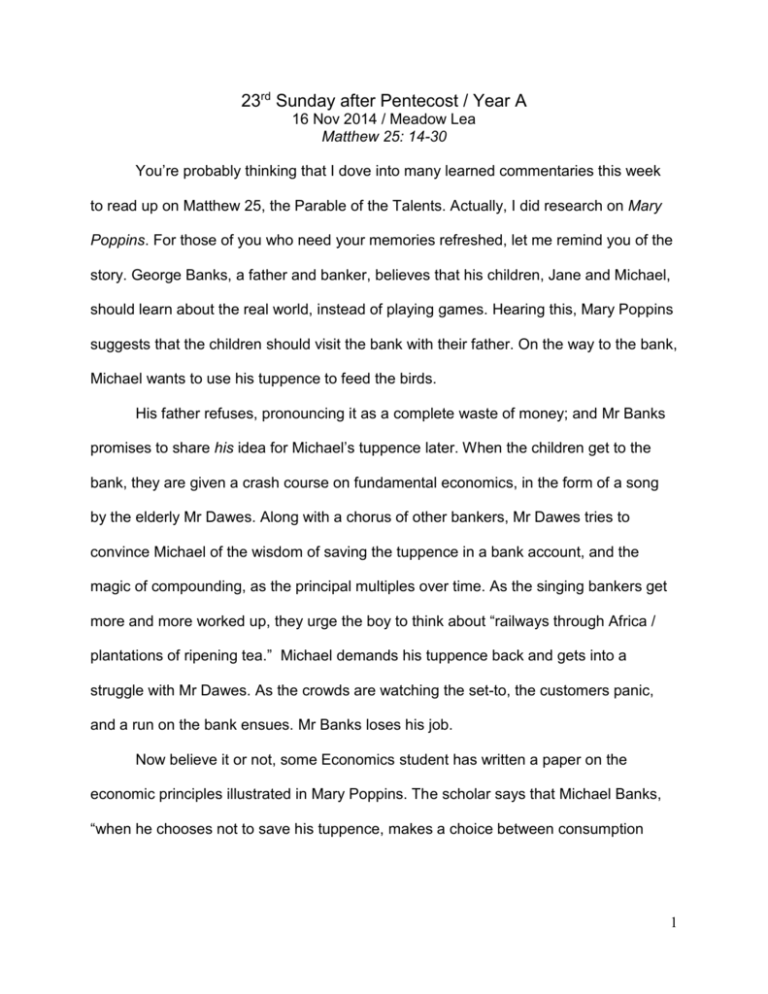
23rd Sunday after Pentecost / Year A 16 Nov 2014 / Meadow Lea Matthew 25: 14-30 You’re probably thinking that I dove into many learned commentaries this week to read up on Matthew 25, the Parable of the Talents. Actually, I did research on Mary Poppins. For those of you who need your memories refreshed, let me remind you of the story. George Banks, a father and banker, believes that his children, Jane and Michael, should learn about the real world, instead of playing games. Hearing this, Mary Poppins suggests that the children should visit the bank with their father. On the way to the bank, Michael wants to use his tuppence to feed the birds. His father refuses, pronouncing it as a complete waste of money; and Mr Banks promises to share his idea for Michael’s tuppence later. When the children get to the bank, they are given a crash course on fundamental economics, in the form of a song by the elderly Mr Dawes. Along with a chorus of other bankers, Mr Dawes tries to convince Michael of the wisdom of saving the tuppence in a bank account, and the magic of compounding, as the principal multiples over time. As the singing bankers get more and more worked up, they urge the boy to think about “railways through Africa / plantations of ripening tea.” Michael demands his tuppence back and gets into a struggle with Mr Dawes. As the crowds are watching the set-to, the customers panic, and a run on the bank ensues. Mr Banks loses his job. Now believe it or not, some Economics student has written a paper on the economic principles illustrated in Mary Poppins. The scholar says that Michael Banks, “when he chooses not to save his tuppence, makes a choice between consumption 1 now, and consumption in the future”. Michael prefers to feed the birds today, instead of saving and investing for tomorrow. How we use our cash is always a big decision! As we speak, an interstellar probe named Philae has landed on Comet 67P, at the end of a 10 year mission. Scientists hope that samples drilled from the comet will unlock details about how our planets evolved— maybe even life. The rock and ice that make up comets preserve organic molecules like a time capsule; and scientists suspect comets delivered water to Earth when they collided with the planet eons ago. The good news is that the rocket science involved actually worked to connect with this moving target half a billion kilometers away. (Makes you wonder why the Bombers didn’t do better this season in catching a few footballs). The bad news is, that the lander is solar powered, and it is stuck in shadow; so the batteries, and all the data being sent back, will run out on Friday. The lander was funded by the European Space Agency at a cost of 1.4 billion euros – 1.7 billion dollars. Ten years of effort, for 5 days of data. A good investment? On Friday, I heard a newscast on CBC Winnipeg radio, about preps for the Santa Claus parade. They’re worried about the condition of Santa’s sleigh. Apparently, it’s getting quite old, and you can now see right through the deck. It needs refurbishing. The city estimates it will cost 50 – 100 K to fix up Santa’s sleigh. A good investment? Dunno. I guess we should ask the kids of Winnipeg. This parable from Matthew tells the story of a wealthy man who entrusts all of his property to three servants. Those of you who had a calculator in hand when I read the lesson, probably realized that the first two servants actually double their master’s 2 money. One servant is given five talents, and makes five more; and the second servant has two talents, and makes two more. So they both manage to double their share of the master’s wealth. Investment managers tell us, that to double an investment involves the Rule of 72. So if your investment has a guaranteed interest rate of 5%, you divide the interest rate into 72, and the answer will be the number of years it will take to double your money. 5% into 72 equals 14.5 years. So my banker would conclude that the master in this parable was away for at least 14 years. Brilliant! Investment managers might also tell you that the process of doubling your money is risky. In the world of venture capital, only about one out of every four or five succeeds in doubling their wealth. The others lose everything. Which brings us back to the Parable of the Talents. Because Jesus told this story after he had made his own personal, high-risk, decision. In Matthew, this parable is placed during the last few days of Jesus’ life, after he had made the decision to leave Galilee and go up to Jerusalem, where the religious authorities will see him as a threat, and the Romans will see him as a disturber of the peace. Obviously the real point in this parable is not about doubling your money, or accumulating wealth. It is about taking risks. It is about Jesus – what he has done, and what is about to happen to him. And it is about what Jesus hopes and expects of us after he has gone. Which isn’t all about money. 3 That’s a relief, because I for one have never been good at investments. I think I have $1059 in my RRSPs. I lie awake at night, wondering where I will spend all that. I don’t imagine that figure will ever double, but ask me in 14.5 years. What I have realized, is that I am rich in many other ways. And now that I’m turning 60, I realize that the gospel, and Jesus’ own life, have taught me the principles that have made me rich. The secret is not the Rule of 72. The secret is this: the important things in life don't multiply until you give them away. Love. Faith. Good works. These things have no cash value, but they double and triple in our world when they are given away. As the song says, “you end up having more.” This doesn’t apply when love, faith, and good works are hidden away. I have told this story before, but I’ll tell it again. A fellow pulls over to help a car which has run out of gas. After talking to the driver of the abandoned vehicle, the driver hands him a full gas can, with one direction: “when you get to where you’re going, you must refill this can, put it back in your own trunk, and on another day, pass it on to someone else in need.” Years later, and hundreds of miles away, the first driver ran out of gas; and because he had given his gas tank away, he had to pull over himself. Within minutes, a good Samaritan pulled up, and reached into his trunk for a gas can to help him out. The driver with the empty tank started laughing: it was his original tank, with his initials still written on it. What we give away to others is the best investment; because it comes back to us many times over. Jesus left us with the gospel. Give it away. Give love and faith away; and make the investment work – not for us, but for him. Amen. 4
